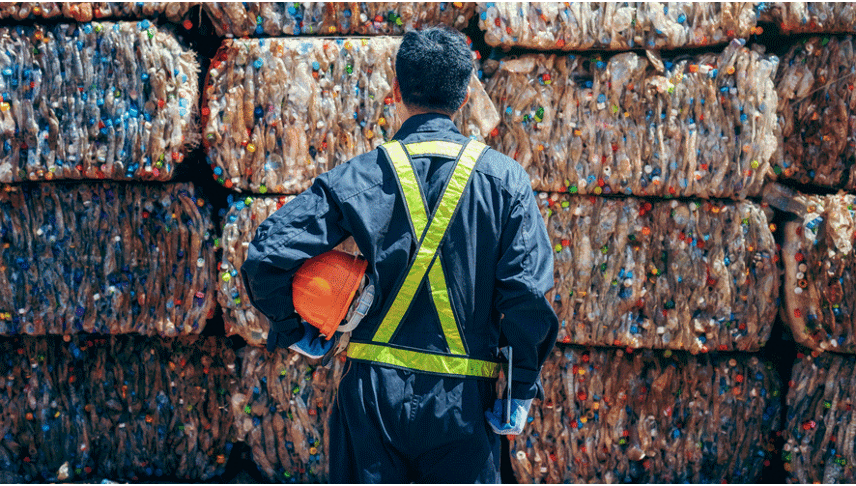Register for free and continue reading
Join our growing army of changemakers and get unlimited access to our premium content

The UN’s Environment Programme (UNEP) has this week mapped out the major policy shifts and market adjustments that would be needed to deliver the overarching aim of the Plastics Treaty – stemming and ultimately ending plastic pollution globally.
The headline conclusion is that it will be possible for the world to reduce plastic pollution production levels by 80% by 2040, on 2020 levels. Most of the reduction will result from technologies that already exist.
Achieving this shift will take unprecedented action from governments, finance and the private sector. Virgin plastic production will need to be reduced, with reusables and alternative materials scaling up significantly. The UN states that a 10% absolute reduction in short-lived plastics production is possible by 2027. 20% of these plastics could reasonably be replaced with reusables, and the majority with alternative materials.
It will be imperative to make these changes, for the sake of human health and planetary health. The report details how $3.25trn of costs related to externalities could be avoided by drastically reducing plastic waste. Included in this calculation are costs relating to human health, air pollution, water pollution and environmental litigation.
A further $1.27trn could be generated through increased recycling revenues and by keeping the value of plastic products in the economy.
To this latter point, the Ellen Macarthur estimates that 95% of the value of plastic packaging materials produced each year is lost through pollution, landfilling, incineration or downcycling. This is equivalent to at least $80bn.
“If we follow this roadmap, including in negotiations on the plastic pollution deal, we can deliver major economic, social, and environmental wins,” said UNEP chief Inger Andersen.
Waste management systems
The UN believes that the world will still be producing some 100 million metric tonnes of plastics from single-use and short-life products by 2040. As such, there is also a need for scaled investment in waste management systems. Developing nations in particular need investment in collection and sorting systems, and there needs to be a global effort to scale chemical recycling. This could help to capture materials not suitable for mechanical recycling, such as flexible packaging.
According to the report, it is possible to grow the global mechanical recycling capacity by 50% by 2027, against a 2016 baseline. Other controlled waste disposal options will need to be scaled by six million metric tonnes in the Global South each year. Further acceleration will then be needed through to 2040.
With these changes and others, plastic leakage could be seven million metric tonnes per year lower in 2040 than it is currently.
Plastic Treaty negotiations
The report has been published ahead of the next round of negotiations on the UN’s Plastic Treaty. Ministers and negotiators will meet in Paris from May 29 for five days of talks to flesh out the Treaty, after the structure was signed off last year.
Last year, negotiators agreed that the Treaty should cover all parts of the plastics lifecycle, ultimately leading to a decrease in virgin plastic production. Nations including Japan and the US had rallied against this, advocating an approach grounded in scaling waste management.
WWF is imploring negotiators to begin work on global bans of what it deems to be the most high-risk and unnecessary single use plastics. These include plastic microbeads in health and beauty products, plastic cutlery and single-use e-cigarettes and vapes. Smoking products are particular concern as they contain batteries which can leech chemicals into the environment.
The NGO has welcomed bans in some nations, including the UK’s microplastic bans. But it has stated that this is not sufficient to meet the global challenge and that all companies and countries should be “on the same level playing field”.
WWF Special Envoy Marco Lambertini said: “We’re locked into a system where we’re now producing quantities of plastic well beyond what any country can properly deal with, resulting in a plastic pollution crisis affecting the environment as well as society.
“And if we don’t take action right now, the situation’s only going to get worse. On our current trajectory, by 2040 global plastic production will double, plastic leakage into our oceans will triple and the total volume of plastic pollution in our oceans will quadruple. We cannot allow this to happen.
“Plastic pollution is a global problem that requires a global solution…. There’s so much technology at the industry’s fingertips to provide more sustainable alternatives and substitutes. We need regulation and incentives to support this transition by sparking innovation and boosting trade in sustainable alternatives.”
Join the conversation at edie’s Circular Economy Action Sessions
On Thursday 25 May, edie is hosting an afternoon of live, interactive webinar presentations and discussions – all dedicated to capturing the business opportunity of a resource-efficient, zero-waste economy. We have confirmed guest speakers from organisations including BT, The Body Shop and the Ellen MacArthur Foundation.
The Circular Economy Action Sessions are free-to-attend and registration grants you access to a recording of the event on-demand once it has finished.
Click here for a full agenda and to register.


Please login or Register to leave a comment.